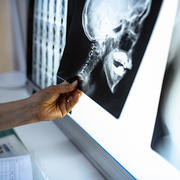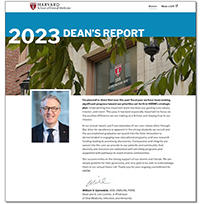
Researchers at Harvard School of Dental Medicine (HSDM) and Massachusetts General Hospital (MGH), a founding member of the Mass General Brigham health system, have been awarded a U.S. Department of Defense grant to fund a four-year study of Fibrous Dysplasia (FD), a severe skeletal disease where benign tumors cause bone deformities, fractures, and pain. The disease affects an estimated 1 in 15,000 to 30,000 individuals, and currently has no cure.
“This funding will allow us to delve deeper into the cellular and molecular underpinnings of this rare condition and explore new pharmacologic tools that could offer hope for the treatment of fibrous dysplasia,” said Yingzi Yang, associate dean for Research at HSDM and leading partner principal investigator (PI) of the project. HSDM and MGH will receive just over $3 million combined in funding for the study.
“What we find could benefit those affected by FD, as well as military personnel suffering from FD and other bone conditions that cause bone pain, stress fractures, heterotopic ossification, and poor fracture healing,” said Yang.
Dr. Marc Wein, partner PI, endocrinologist and associate professor of medicine at MGH, treats FD patients and performs studies related to FD pathogenesis in his research laboratory. He sees the debilitating effects of the disease firsthand.
“We usually see the disease start in young people. It causes life-altering bone deformities, increases skeletal fragility, and leads to severe and intractable bone pain. Currently we are lacking treatments for FD that slow lesion growth, address bone pain, and restore skeletal integrity. We hope to get a better understanding of the molecular and cellular pathogenesis of this disease,” Wein said.

“We will study how normal and abnormal cells talk to one another using a novel approach to study inter-cellular communication. This work will identify new mechanisms through which rare mutation-bearing cells cause dramatic problems throughout the skeleton,” Yang said.
Drs. Yang and Wein worked closely with the FD/MAS Alliance, a non-profit that advocates for evidence-based treatments for Fibrous Dysplasia and McCune-Albright syndrome, which provided initial pilot grants for the funded study.
“Encouraging research is a cornerstone of the FD/MAS Alliance mission,” said Adrienne McBride, executive director of the FD/MAS Alliance. “We look forward to building on our partnership to advance the development of evidence-based treatments for individuals with fibrous dysplasia/McCune-Albright syndrome (FD/MAS).”


